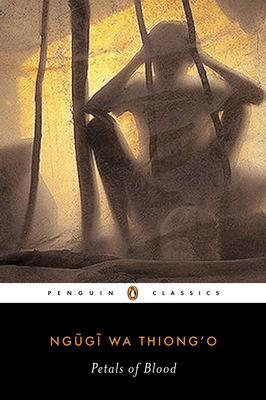The title of Ngugi wa Thiong’o’s novel Petals of Blood (1977) is taken from “The Swamp”, a poem by Derek Walcott. The novel is set in the aftermath of Kenyan independence. The story follows schoolteachers Munira and Karega, and barmaid Wanja and her boss Abdulla, as they cope with the fast modernization of their rural village Ilmorog.
The story begins with a glance at its ending: three notable Kenyans—a teacher and two successful businessmen—have died in a fire. Inspector Godfrey, who believes that the police force is “the maker of modern Kenya”, investigates. His suspicion falls on the schoolteacher Munira.
From here, the novel moves back to the beginning of the story. Schoolteacher Munira arrives in the pastoral village of Ilmorog, to take up a position at the village school. Many teachers from the city have come and gone in Ilmorog, and the villagers assume that Munira won’t last. His new neighbors treat him with suspicion, and few children come to his classes. However, Munira befriends the owner of a local bar, Abdulla, a hero of the Mau Mau rebellion, who helps Munira to settle in the village. Munira also befriends Joseph, a young boy whom Abdulla has adopted. Eventually, Munira is accepted as one of Ilmorog’s own.
Another refugee from the city arrives, Wanja, the granddaughter of a respected Ilmorog elder. She begins working in Abdulla’s bar, helping him to expand the business. Soon, Munira finds himself falling in love with her. Munira and Wanja have a brief relationship, but Munira is married, and when Wanja discovers this, she is bitterly disappointed. She leaves the village for a time; when she returns, she breaks off the affair.
A former colleague of Munira’s, Karega, arrives in Ilmorog to question Munira about events at the school where both used to work. Karega ends up taking a position at the school. That year, the village suffers a long, dry summer and a poor harvest. Karega rallies the villagers and leads them to Nairobi to ask their Member of Parliament for help.
It is a long journey. On the way, Joseph becomes very ill. As soon as the villagers arrive in Nairobi, they try to get help for Joseph. A minister turns them away, assuming they are beggars. Finally, they are admitted to the house of a rich man, only to be rounded up and imprisoned in the building. They are subjected to questioning by the house’s owner Kimeria, an unscrupulous businessman. Kimeria makes the villagers believe that he and their MP are allies. Later he blackmails Wanja and rapes her.
The villagers go to meet their MP anyway. They find that he is an empty demagogue with no interest in their plight. However, a Nairobi lawyer takes an interest in their case, advancing it through the courts and attracting national press attention. As a result, journalists and charity workers pour into Ilmorog.
When the rains finally come, the villagers celebrate with ritual dances. A villager named Nyakinyua brews a powerful traditional drink made from the Thang’eta plant. All the villagers partake of the drink. Under its influence, Karega confesses to Munira that he had an affair with Munira’s older sister, Mukami. Munira and Mukami’s father forced her to leave Karega due to Karega’s brother’s involvement in the Mau Mau rebellion. This was the real reason for Mukami’s suicide.
A plane crashes in the village, miraculously killing no one but Abdulla’s donkey. Many people come to see the wreckage, and Wanja suggests they capitalize on this tourism by selling the Thang’eta drink in Abdulla’s bar. The drink becomes a notorious attraction of the village, and tourists begin visiting just to try it. Soon, Wanja starts a brewery making the drink.
Karega and Wanja start seeing one another. Seething with jealousy, Munira schemes to have Karega fired from the school. Karega is forced to leave Ilmorog.
The government begins building a new road—the Trans-Africa road—right through the village. Workers arrive, and the village rapidly expands. Soon it is a town, New Ilmorog. The farmers of the old village are advised to fence their lands and mortgage them, so they can prove they own them. Banks offer them loans against their harvests to pay for this. When Nyakinyua dies, the bank moves to seize her land, so Wanja sells her brewery in order to buy Nyakinkua’s land. She opens a brothel catering to the new arrivals and is eventually forced to work as a prostitute herself.
Karega returns, telling Wanja that after his departure, he collapsed into alcoholism before finding a job in a factory, from which he has been fired. Though they still love each other, they cannot agree about how to live in the new Kenya, and Karega leaves again. Munira tries to rekindle their relationship, but Wanja simply asks him to pay. He does so, and they have sex.
Wanja comes up with a plan to rid herself of the men who have taken advantage of her. She invites them all to the brothel, including Karega and Kimeria. Her plan is to present Abdulla to them as her chosen partner. However, Munira sees Karega arrive and then leave again; in a fit of jealousy, he sets fire to the brothel. The other men die, while Wanja is hospitalized.
Inspector Godfrey charges Munira with arson and Munira is imprisoned.

